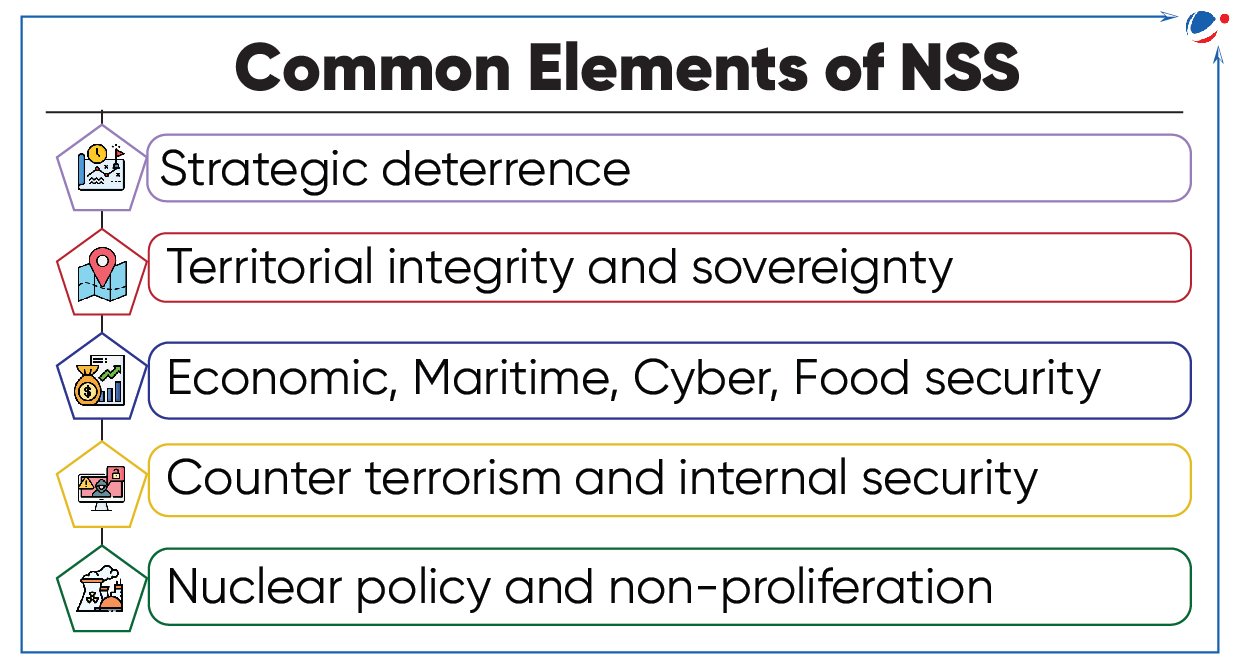Why in the News?
The Chief of Defence Staff (CDS) contested the need of a written National Security Strategy (NSS), sparking debate about importance of a NSS document.
What is National Security Strategy (NSS)?
- An NSS is a concise summary of a country's strategic vision and objectives and encompasses domestic and external challenges and addresses traditional, non-traditional threats and opportunities and updated periodically.

Why does India need a written National Security Strategy?
- Lack of Written Policy: The only political direction for the Armed Forces is Raksha Mantri's operational Directive of 2009, which has not been updated.
- Major powers like the US, UK, and Russia have published and updated NSS.
- Meet changing security dynamics and priorities: It can encourage the government to regularly review threats, opportunities, and global security trends, ensuring evolving challenges like the hybrid warfare, Chinese navy's growth etc. are addressed timely.
- Framework for effective Long-term Planning: A coherent future strategy will help avoid taking short-term, ad hoc, hasty, and regime-centric decisions on important national security issues.
- Strategic Signaling in world order: It will clarify India's strategic intent to friends and foes, highlight its role as a security provider in the Indian Ocean, and establish clear cooperation with partners.
- Continuity to Defence Planning: Discontinuation of Defence Plans (5 year plans) and Long-Term Perspective Plans (15-year plans) adds urgency to formulating the NSS.
- Operational clarity: It can help guide decision-making in areas like delegation, operationalision of theatre commands etc.
- It will reduce ambiguity and build meaningful accountability by acting as a reference for peer review by think tanks.
- Adopt Whole of nation approach: It can help build synergy for harnessing comprehensive national power and coordinate operations effectively.
Challenges in codifying NSS in India
- Lack of Political Will: Factors like lack of political consensus on national security issues, fear of accountability, limited expertise on defence matters etc. have prohibited the political leadership from formulating an NSS
- Loss of strategic flexibility: Implementing an NSS would commit the political leadership to a specific approach, whereas ad hoc policymaking allows flexibility.
- E.g., Israel operates without formalized NSS policies.
- Resource Allocation: Effective NSS implementation necessitates adequate financial and human resources and capability-building to meet set objectives.
- Weak Institutional support and policy feedback: Only few defense and security think-tanks currently exist in India.
Previous steps taken to draft NSS
|
Conclusion
NSS can spell out clear-cut ends, ways and means, while relying on delegation, synergy and operational freedom. At cutting-edge level, it will foster initiative, innovation and improvisation. Two versions of the document can be released to mitigate the confidentiality issues: Public version for external stakeholders and adversaries, signaling our intentions and methodologies and classified version for security agencies to act upon. As India enters Amrit Kaal, a term signifying a prosperous and self-reliant future, it is crucial to discard hesitation and ambiguity in national security planning.





